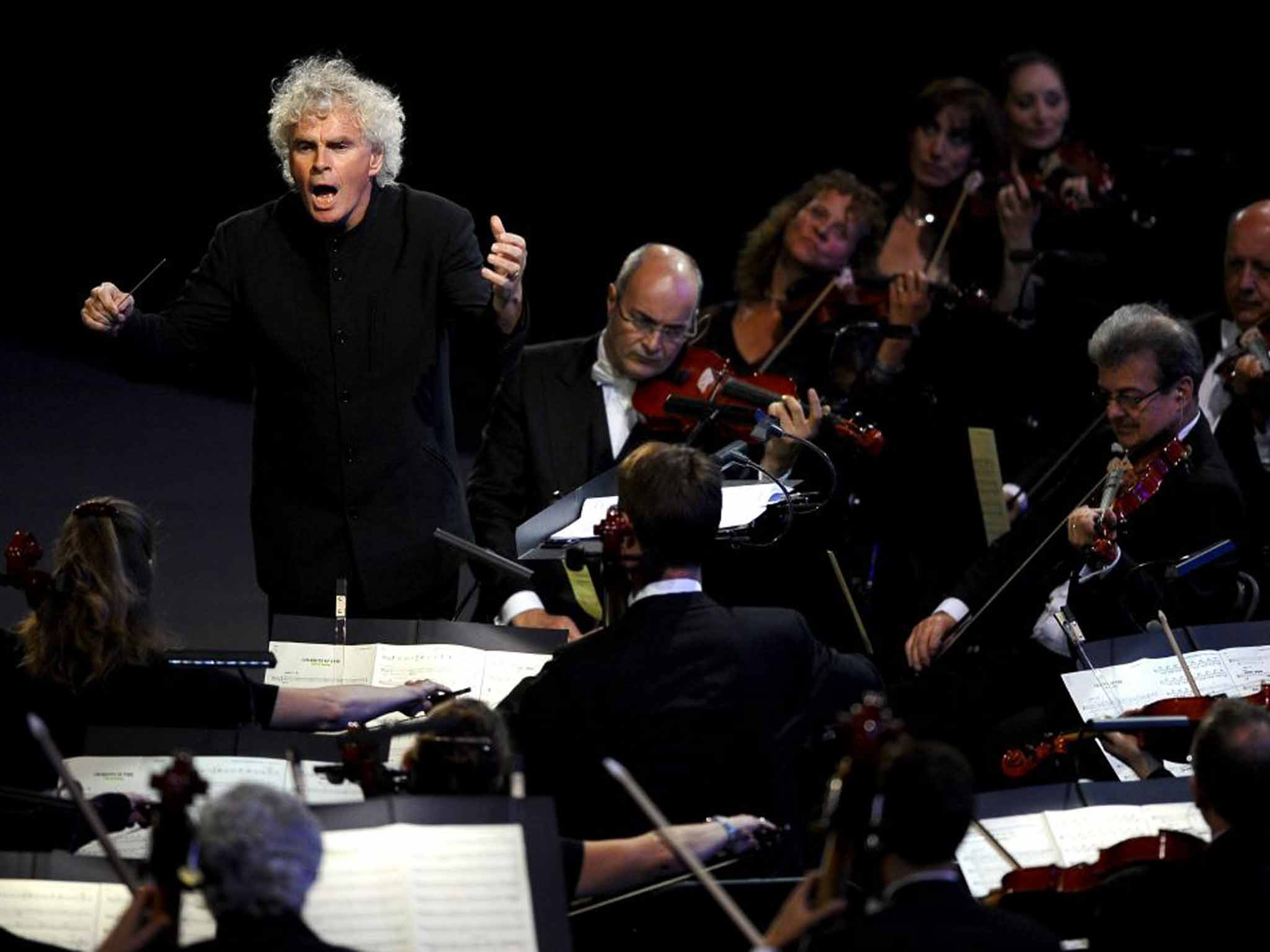Will Simon Rattle take over at the LSO?
Today's pre-eminent British conductor would arrive with a reputation for championing better conditions for artists

Your support helps us to tell the story
From reproductive rights to climate change to Big Tech, The Independent is on the ground when the story is developing. Whether it's investigating the financials of Elon Musk's pro-Trump PAC or producing our latest documentary, 'The A Word', which shines a light on the American women fighting for reproductive rights, we know how important it is to parse out the facts from the messaging.
At such a critical moment in US history, we need reporters on the ground. Your donation allows us to keep sending journalists to speak to both sides of the story.
The Independent is trusted by Americans across the entire political spectrum. And unlike many other quality news outlets, we choose not to lock Americans out of our reporting and analysis with paywalls. We believe quality journalism should be available to everyone, paid for by those who can afford it.
Your support makes all the difference.The British music world is waiting to hear whether the London Symphony Orchestra has succeeded in appointing Simon Rattle as its new music director – and waiting, and waiting. Speculation is reaching fever pitch as his sold-out London residency with his current orchestra, the Berliner Philharmoniker, approaches: a celebration of his 60th birthday including associated television and radio programmes, education and outreach activities and a scramble for box-office returns.
The fact is that appointing a music director is probably the hardest job an orchestra ever has to do. Appointing the right one is harder still. Like a game of Mouse Trap, a complex chain of cause and effect must fall into place to catch the target, and the process depends on the dice of fate rolling out a helpful result. Good chemistry between orchestra and conductor is elusive and worth a lot of money: some orchestras pay their music directors a seven-figure salary. A clever appointment can transform an orchestra, in time, from adequate to great. Get it wrong and it can take years to recover.
Big-name conductors are relatively rare animals compared to the number of orchestras that would like to engage one; those respected by their musicians are rarer still. And as most contracts run for at least three years, if not five, the timing has to be right: the maestro of the moment has to be free enough to take a job when the vacancy arises.
Not all orchestras choose their man (or, more rarely, woman) in the same way. The Berliner Philharmoniker's players elect their music director by ballot. That can be a mixed blessing. Rattle won the vote in 1999, but some musicians voted instead for Daniel Barenboim; after such a start, lingering resentments could conceivably create uncomfortable factions. The Suisse Romande Orchestra, too, votes for its head honcho; today it is announcing that another British conductor, Jonathan Nott, has been elected as its next music director, with a rare unanimous vote. The Berliner Philharmoniker will select Rattle's successor later this year.
In the US, by contrast, most appointments rest with the management; the players might not even be consulted. Choices can be swayed by what the maestro can bring along in terms of record contracts, links with international festivals, potential sponsorship and moneyed contacts. Here, players of London self-governing orchestras have some say via their elected representatives on the board. Many orchestral musicians will tell you, with huge cynicism, that if the decision were left solely to the players, they would probably choose a person with a clear beat who lets them out of rehearsals early.
Rattle's appointment to the LSO would carry great expectations, perhaps too great. Today's pre-eminent British conductor would not only become a figurehead for the UK's flagship orchestra; he would arrive with a reputation for championing better conditions for art and artists. He pushed for the building of Symphony Hall, Birmingham, during his 18 years with the City of Birmingham Symphony Orchestra; and at the Berlin Philharmonic, he has spearheaded revolutionary initiatives besides demanding better pay for his players.
London desperately needs a world-class concert hall; those in Birmingham, Manchester and Gateshead are finer in terms of architecture and acoustics than anything in the capital. Rattle is one of few figures who has the passion, determination and gravitas to fight for one. Yet politically the prospect has never seemed so remote. It is eminently possible this may have formed part of the LSO's negotiations with Rattle and if it turns out that it is recalcitrant politicians that have held things up… well, don't be too surprised. The contrast in political goodwill towards classical music between Germany – which takes it proudly as part and parcel of cultural life – and the UK – which insists on fighting about "elitism" – probably doesn't help.
Hall aside, the LSO needs a music director who will put it first. Its current incumbent, Valery Gergiev, seems more committed to his Russian base at the Mariinsky, St Petersburg – where he could well be obliged to show public support for Putin in order to assure its funding. This has done little to endear him to the British public, however great a musician he is.
And so to the music: the best results happen when a conductor builds a constructive relationship with an orchestra during a lengthy stay involving real commitment. Rattle has offered that commitment successively to the CBSO and the Berliner Philharmoniker. If he were to join the LSO for the long haul, then perhaps anything is possible.
Simon Rattle and the Berliner Philharmoniker, Southbank Centre and Barbican, London (0844 875 0073) 10 to 15 February
Join our commenting forum
Join thought-provoking conversations, follow other Independent readers and see their replies
Comments